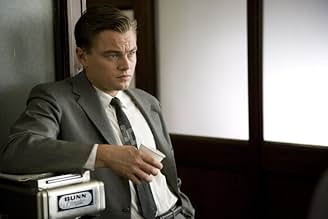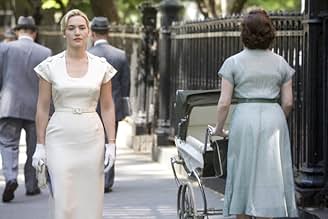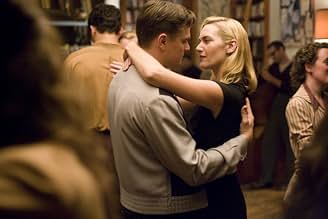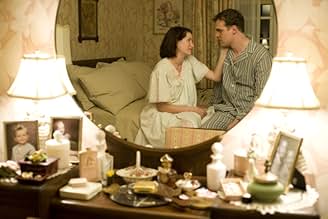Una joven pareja que vive en un suburbio de Connecticut a mediados de la década de 1950 lucha por aceptar sus problemas personales mientras intenta criar a sus dos hijos.Una joven pareja que vive en un suburbio de Connecticut a mediados de la década de 1950 lucha por aceptar sus problemas personales mientras intenta criar a sus dos hijos.Una joven pareja que vive en un suburbio de Connecticut a mediados de la década de 1950 lucha por aceptar sus problemas personales mientras intenta criar a sus dos hijos.
- Dirección
- Guionistas
- Elenco
- Nominado a 3 premios Óscar
- 20 premios ganados y 73 nominaciones en total
- Party Dancer
- (as Joe Kamara)
- Dirección
- Guionistas
- Todo el elenco y el equipo
- Producción, taquilla y más en IMDbPro
Opiniones destacadas
'Revolutionary Road' may not be "revolutionary" and it is not perhaps a film that will be re-watched over and over by me. This said, there is so much to appreciate, there is no denying that it's incredibly well made and superbly acted. And to me and many others (though it is an understandably polarising film, the dark and unpleasant subject matter is not for everybody) it is a powerful and moving film, and one of the most realistic and truthful depictions of a struggling marriage on film.
Visually, 'Revolutionary Road' is wonderfully shot, bleak but also sumptuous, while the scenery and 50s production values are evocatively and handsomely rendered. Thomas Newman's music score is hauntingly hypnotic, achingly melancholic and at times ominous.
While at times stagy, the dialogue is insightful, making one really think about what it's saying (it has much to say and knows how to say it without preaching) and for many will wrench the gut and induce floods of tears. There is a little levity provided by Kathy Bates, that could have been ill-fitting but is pitched well. The story is deliberate, but the atmosphere is brilliantly evoked and there are many parts that have huge power and are emotionally devastating, especially in the latter parts.
Sam Mendes keeps things at an assured pace, keeps the atmosphere alive and doesn't undermine the chemistry between DiCaprio and Winslet in any way. DiCaprio and Winslet embody their roles, which are intentionally not the most likable, are very complex and very much compellingly real, and their chemistry is both tense and affecting. Winslet has the more complex one of the two and her performance is a heart-wrenching emotional roller-coaster, while DiCaprio gives an explosive turn especially in the fever pitch latter parts.
Michael Shannon proves himself to be a scene stealer as the brutally honest crazy nut, and Kathy Bates brings well-timed levity.
Overall, a powerful and moving film that is highly appreciated in many ways. 9/10 Bethany Cox
It's a nice story, but not one I could terribly worked up about. So Leonardo is working for some firm as a sales rep and it's a job he hates. Good for him, 90% of the American work force are in jobs that are just paychecks to support themselves and their families. Which Leo and Kate increased by two during the course of the film.
Seeing themselves in a rut, Kate lets fly the brilliant suggestion that he just quit and move to Paris. Not only that he should just 'find himself' and she'll work and support and raise the kids and him. Leo likes the idea, but then gets cold feet and it goes downhill from there.
Leo and Kate are fine, but the film just is not up to the standards set by Titanic. I sure cared a lot more about Jack and Rose than I did about either of the Wheelers. Nevertheless Revolutionary Road which is the name of the street the Wheelers live on in the film, got three Oscar nominations including one for Michael Shannon as the bipolar son of the Wheeler's neighbor Kathy Bates who sold them the house. Nowadays Shannon would be on his meds and leading a more productive life than he is here. Shannon lost for Best Supporting Actor to Heath Ledger for the Dark Knight.
Revolutionary Road is entertaining, but hardly groundbreaking.
It's 1955. Frank and April Wheeler have been married seven years, live in the Connecticut suburb and have two children. Frank works for a company that his father worked for, and he hates his job. April is a stay-at-home mom who wanted to be an actress.
While it might look good on the outside, this isn't the life either one envisioned. But April has an idea. They have enough money saved so that they can move to Paris, a city Frank loves. She can get a job as a secretary, which pays very well over there, and Frank can stay at home and decide what he really wants to do with his life. It sounds possible but maybe not practical, though Frank ultimately agrees to it.
Frank can't seem to find the right moment to give his notice; and then April discovers that she is pregnant. What now? There are lots of layers in this emotionally resonant, magnificently acted film. It's very much a story of its time for several reasons. The first is that it's obvious that April suffers from very bad depression. Though post-war psychological problems were recognized, actual depression, especially in a woman, probably wasn't given much attention. It was the returning soldiers who had suffered trauma who had the psychiatric focus. If by some means she had been discovered to have clinical depression, the medicine was horrible.
The second thing is that it was 1955. The ideas of picking up and moving to Europe with your family and the woman as breadwinner were outrageous back then. Now, not so much.
The third reason is that April at least had an artist's mentality and an artist's way of looking at the world. In this world, we have the practical and the artist, as in the O'Neill play Beyond the Horizon, where one brother is a farmer and the other brother is a poet who dreams of going out to sea. The problem is, there's no way to kill those attributes, and if you try, you won't be happy. April shouldn't have been married, shouldn't have been living in the suburbs, and shouldn't have stayed home.
Frank is more practical, though he'd like to be different, would like to do something he loves, if only he knew what that was. April thought he was cosmopolitan, adventurous, and that together, they'd be special. The idea that they're not special is something she can't tolerate.
This is such a fascinating movie about life's disappointments, punctuated with some humor by Kathy Bates as Mrs. Givings, a loquacious woman, whose son (Michael Shannon) has been institutionalized. When he meets the Wheelers, he has an uncanny way of speaking exactly the truth no one wants to hear. Shannon does a fantastic job in these disturbing scenes.
A shattering movie. I like to be entertained in films. I feel like we all have so much to reality to face, why not be able to turn away from it - but a beautifully realized film like this about dysfunction - somehow, I don't mind.
Sam Mendes is a filmmaker who knows exactly what he wants, which is why he would want to work on this film. Revolutionary Road is probably his least interesting film, story wise. After-all, it's just about two people who try to cope with their lives. There is no motivational plot to it, but the thing about this film is that it doesn't need one. We are getting a glimpse into the lives of two people who had big dreams and realized that they had to sacrifice them in order to live their lives. It's sad, but it also rings true.
The film stars Leonardo DiCaprio and Kate Winslet, as the married couple who constantly fight. Everyone called this film the "What If Jack and Rose Ended Up Together" movie. Yet it is so much more than that. They give powerful performances, which unfortunately were overlooked during the Oscar season. Another Titanic star, Kathy Bates, gives her support to the couple as the real estate agent who thinks the world of them. She has a son, who is mentally unstable and asks to bring him over for dinner one night. Michael Shannon plays the son and he steals both scenes he is in. For a guy who is deemed insane, he is the only one who speaks the truth.
I watched this flick because so many people told me how depressing it was. While it was depressing I didn't find it to be that bad. The most depressing aspect of the film is how relatable it is to real life. This story happens everywhere and that is the sad part.
The cinematography is great, the 1950's feel was spot on and really gave the film more of a cinematic sense of wonder to it. Roger Deakins seems to know exactly what is needed for every film he takes on. The look and feel of the film here is so simple, yet so beautiful at the same time.
Finally, I can see why people may not like this film. It's definitely an acquired taste. I was not in love with it by any means and for those involved it's not their best work. Instead it's a film to enjoy once. I wouldn't bother watching it again because the pace is long and I feel that I won't be as engaged a second time.
On a final note, why do guys from the 1950's only last about 15 seconds?
¿Sabías que…?
- TriviaWhile directing the love scene between Leonardo DiCaprio and Kate Winslet, director Sir Sam Mendes, Winslet's then-husband, opted to watch the monitor from another room. Mendes admitted that directing his own wife in a sex scene was awkward, but added that directing sex scenes are always awkward. Winslet found this very uncomfortable. "Leo's my best friend, Sam's my husband, this is a bit weird!" However, DiCaprio found it very easy, as "we've done this a thousand times before", while filming Titanic (1997).
- ErroresWhen April shows Paris on the globe, the borders of the European countries are current. Most notably, the reunified Germany is visible, with the borders it did not have until 1990.
- Citas
April Wheeler: So now I'm crazy because I don't love you, right? Is that the point?
Frank Wheeler: No! Wrong! You're not crazy, and you do love me. That's the point, April.
April Wheeler: But I don't. I hate you. You were just some boy who made me laugh at a party once, and now I loathe the sight of you. In fact, if you come any closer, if you touch me or anything, I think I'll scream.
Frank Wheeler: Oh, come on, stop this April.
[He touches her for an instant and she screams at the top of her lungs before walking away. He chases after her]
Frank Wheeler: Fuck you, April! Fuck you and all your hateful, goddamn...
[He breaks a chair against a wall]
April Wheeler: What are you going to do now? Are you going to hit me? To show me how much you love me?
Frank Wheeler: Don't worry, I can't be bothered! You're not worth the trouble it would take to hit you! You're not worth the powder it would take to blow you up. You are an empty, empty, hollow shell of a woman. I mean, what the hell are you doing in my house if you hate me so much? Why the hell are you married to me? What the hell are you doing carrying my child? I mean, why didn't you just get rid of it when you had the chance? Because listen to me, listen to me, I got news for you - I wish to God that you had!
- Créditos curiososIn the end credits, there are six for songs where no individual is mentioned, just the group name. Of the six, five read "Performed by," followed by the name of the group. One, "Performed The King Cole Trio." incorrectly omits the adverb "by." It should be "Performed BY [my emphasis] The King Cole Trio."
- ConexionesFeatured in At the Movies: Summer Special 2008/09 (2008)
- Bandas sonorasThe Gypsy
Written by Billy Reid
Performed by The Ink Spots
Courtesy of Geffen Records
Under license from Universal Music Enterprises
Selecciones populares
- How long is Revolutionary Road?Con tecnología de Alexa
Detalles
- Fecha de lanzamiento
- Países de origen
- Idioma
- También se conoce como
- Revolutionary Road
- Locaciones de filmación
- Productoras
- Ver más créditos de la compañía en IMDbPro
Taquilla
- Presupuesto
- USD 35,000,000 (estimado)
- Total en EE. UU. y Canadá
- USD 22,911,480
- Fin de semana de estreno en EE. UU. y Canadá
- USD 189,911
- 28 dic 2008
- Total a nivel mundial
- USD 75,981,180
- Tiempo de ejecución1 hora 59 minutos
- Color
- Mezcla de sonido
- Relación de aspecto
- 2.35 : 1







































